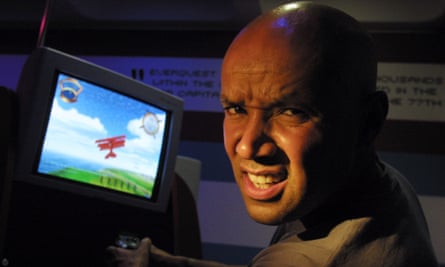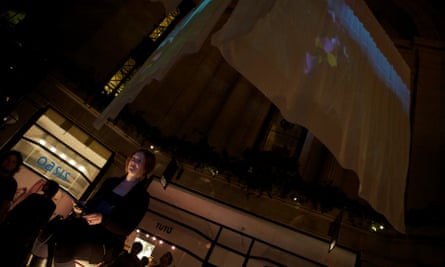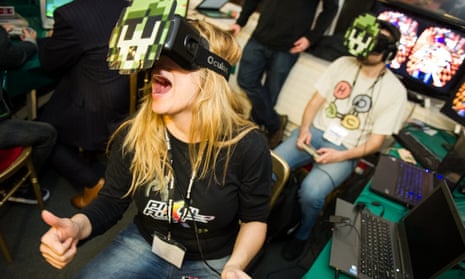In August it looked like game over. The National Videogame Arcade, a fascinating institution that opened in March 2015 to promote the cultural and economic significance of games, was facing closure. Although the large building in Nottingham’s creative quarter attracted plenty of visitors with its mix of classic arcade machines, specialist interactive installations and events, it was not turning a profit. Meanwhile there were 40 staff to pay and a large rented building in central Nottingham to maintain. Over the summer, directors Iain Simons and Jonathan Smith made the decision to call in an insolvency firm.
“It became horribly clear, horribly suddenly, that we weren’t going to be able to pay salaries,” says Simons, who has been creative director of the GameCity festival, which spawned the NVA, since it began a decade ago. “We sat down with everyone individually and told them. We asked everyone if they would work for deferred payment in order for us to get a plan together. This was in the middle of the summer season, our busiest time – and every single member of staff came back to work. We stayed open seamlessly while this all took place; the only reason we’ve been able to survive is because the staff cared about it so much.”
With the time available, Simons set about finding investors to keep the NVA afloat. They weren’t sure what to expect, primarily because with its mix of archive, event space, museum and industry networking centre, there’s nothing like the NVA anywhere else in the UK. There are small-scale festivals; there have been major installations such as the Barbican’s excellent Game On exhibition in 2002, and there are several video game hubs and shared working collectives dotted around the country. But nothing offering a permanent home to the idea of video games as a sociocultural and educational endeavour.

But help came. Ian Livingstone, founder of Domark and Games Workshop, a longtime advocate of games as an artistic and creative force, came aboard as an investor, as did Sumo Digital and PlayGround Games, two highly successful British development studios. Several independent game makers who have found success after first exhibiting their games at the NVA’s annual GameCity festival, have also invested, including Rami Ismail of Dutch studio Vlambeer, a regular attendee of the festival, and William Pugh, award-winning co-creator of the Stanley Parable.
“The NVA is incredibly valuable,” says Pugh. “It is the only UK institution of its size that’s consistently championed the cultural and experimental work going on in the games space.”
The result is the formation of the National Videogame Foundation, which will run both the NVA and the GameCity festival, but will also expand its remit to take on education and public advocacy work. Later this year, the foundation is collaborating with the Times Educational Supplement, to stage a series of “subject summits”, “bringing together educators with experts to explore ways in which video games can be used to enhance learning”.
Simons hopes the events will help to create school resources that can be applied to various curriculum areas. “The Foundation aims to inspire new people to make video games, start new conversations about them, and find new ways in which they can contribute to culture, society and education,” states the press release.
“It’s a really exciting time,” says Simons. “We’re already working on new exhibitions and outreach for the next year and onwards and in particular we’re ramping a lot on international collaborations. We participate actively in an international curatorial group, helping to develop strategies for interpreting and touring games around the world. It’s great to see the kinds of things that we’ve been thinking about for years start to become shared conversations.
“We’re also going to be doing a lot more work advocating for video games in culture more broadly. The ‘Continue’ conference we did earlier this year with the Arts Council is something we’re going to be building on a lot. We really want to make the NVA for something, turn the cultural capital that we’ve managed to generate into cultural confidence for video games themselves. That means working hard to inspire new people, to make new games about new things.”

Simons is also promising to rejuvenate the GameCity festival which has been an important annual highlight of the UK games calendar for10 years, with developers coming from all over the world to put on often offbeat and ambitious events around Nottingham. A Harry Potter concert in St Mary’s Church, a molecular gastronomy evening with developer Éric Chahi, a live Resident Evil experience; while most game events focus on banks of demo units playing the latest triple A titles, GameCity has always taken a more thoughtful, inclusive and idiosyncratic look at what a gaming festival should be.
“The truth is, last year we didn’t deliver the thing we wanted to and disappointed some people.” he says. “We’d just started a company, designed, built and opened a National Videogame Arcade and survived our first summer season – then we went directly into trying to deliver a GameCity and we just couldn’t do it. I’m not offering that as an excuse, because we let people down and we’re really sorry, but it was through exhaustion rather than laziness.”
The National Videogame Arcade and GameCity live on, with what looks like sound financial backing from many in the industry that have attended the building and festival in the past. Simons say revenue will come via a restructured commercial plan, from patrons and sponsors, and from new research projects. But the arcade also needs to attract more visitors, and that will involve building on the idea that games are a worthwhile cultural day trip. In the US, Japan and throughout Scandinavia, video games seem more intuitively accepted into the arts and culture firmament. It would have been a blow for the UK games industry for the NVA to close – it just needs to communicate what has been saved.
“There was a moment a few weeks ago, when I thought we were going to lose everything,” says Simons. “It’s terrifying having worked on something for so long to contemplate what that might be. It’s just incredibly humbling and more than a little moving to be given the chance of having a new chapter.”






